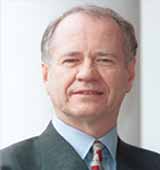|
Executive Interviews: Interview with Samuel E Bodily on Decision Making
May 2008
-
By Dr. Nagendra V Chowdary
 Samuel E Bodily
Samuel E Bodily John Tyler Professor of Business Administration at The Darden School, University of Virginia. 
-
Events in business never proceed
exactly as planned. Such intangibles
as friction, uncertainty, fluidity and
disorder complicate decision making.
What is the cost of poor decisions?
How to avoid strategic errors in
decisions?
An effective manager will anticipate
that there will be uncertainty, fluidity,
and change. A secret to success is to
prepare by understanding what may happen, and to set in place
contingent arrangements, options,
and risk reducing activities to enable
yourself to slide off to some other
attractive option if things turned out
in certain ways. This is what we
teach.
|
|
-
Jim Collins, in an article in
Fortune (June 27, 2005) distinguished
between bad decisions and wrong
decisions. What according to you is
the distinction between bad decisions
and wrong decisions?
I agreewith howCollins characterizes
wrong decisions as unforced errors.
Yet what he refers to as bad decisions,
choosing door #1 when the prize is
behind door #2, may not really be a
bad decision if it is equally likely
that the prize is behind either door,
the outcome is random, it isn't your
fault that only half the time you will
find the prize. This is a matter of
seeing the difference between a good
outcome and a good decision. In
2007, we did an experiment called A
Random Act of Kindness to Darden's
Luckiest student one briefcase
contained $17,500 and another
contained zero. The student could
choose a briefcase and open it or
could accept $5,679 of real money.
The student chose to pick a briefcase.
And when he opened it there was $0
in it. The significant choice was
whether to take the $5,679 or the
briefcase. It wasnt necessarily a bad
decision for him to pick a briefcase
it had an expected value of $8,750
you could say it was a good decision.
The fact that the briefcase he picked
had $0 in it was a bad outcome, yet
purely random, and not what I
would call a bad decision. -
Theres enough literature on
decision making styles and traits of
effective decision makers. But, what
according to you are the prerequisites
for effective decision making?
First, understand the sequence of
choices and uncertain events you
face. Next, assess the consequences of
choices youwill face in terms of value
to you thismight bemoney, or years
of remaining life, or satisfaction.
Forecast the likelihoods of the
consequences for each alternative.
Then pick the one with the best
profile of risk.
1.
Decision Making Case Study
2. ICMR
Case Collection
3.
Case Study Volumes
|
The Interview was conducted by Dr. Nagendra V Chowdary, Consulting Editor, Effective
Executive and Dean, IBSCDC, Hyderabad. This Interview was originally published in Effective Executive, IUP, May 2008. Copyright © May 2008, IBSCDC
No part of this publication may be copied, reproduced or distributed, stored in a retrieval
system, used in a spreadsheet, or transmitted in any form or medium electronic,
mechanical, photocopying, recording, or otherwise without the permission of IBSCDC. |
